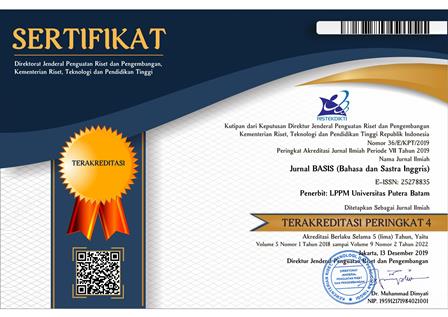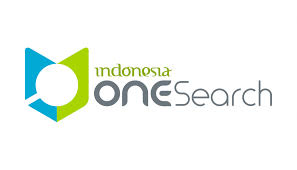ANALYSIS OF STUDENT’S ABILITY IN IDENTIFYING FIGURATIVE LANGUAGE IN MARIAH CAREY’S SONGS
DOI:
https://doi.org/10.33884/basisupb.v7i1.1748Keywords:
Analysis, Figurative Language, Song lyricsAbstract
Figurative language is one way of conveying words other than the normal way. This helps song writers compose and produce beautiful songs. Figurative language is part of semantics. Semantic is the study of meaning that is used to understand human expression through language. With semantic we can know the true or actual meaning in a song. This study aims to find student’s ability in identifying kinds of figurative language and their meanings in lyrics of Mariah carey selected song. Descriptive qualitative method is the method used in this study. The instrument for collecting the data was test questions which consisted of 12 questions. In this research, the subject was 11th grade class of SMA Swasta GKPI Padang Bulan which consisted of 28 students. The result of data analysis shows that the students mean score is 76,7 the highest score is 92, while the lowest score is 50. There were 4 student, (14,3%), belonged to the very good level and 21 students (75 %), belonged to the good level and there were 3 students, (10,7%), belonged to sufficient level.Kind of figurative language was found in Mariah Carey songs lyric are simile, metaphor, hyperbole, and personification. The dominant types of figurative language found in Mariah Carey song lyrics is metaphor.From an analysis ,the researcher concluded that most of the students of the second grade class of SMA Swasta GKPI Padang Bulan Medan got dificulties to different between metaphors and personifications in identifying figurative language in mariah carey’s songs lyrics.
References
Arifah, K. 2016. Thesis: Figurative Language Analysis in Five John Legend’s Songs. Malang: Maulana Malik Ibrahim State Islamic University.
Arikunto, S. 2001. Prosedure Penelitian :suatu pendekatan praktek. Jakarta: Rhineka Cipta.
Azwardi, S. 2016. Analysis of Figurative Language Used In Some Coldplays’ Song Lyrics. University of Mataram.
Geoffrey, M., David, D., & David, F., 2005. Essentials of Research Design and Methodology. New Jersey: John Willey & Sons Inc.
Griffiths, P. 2006. An introduction to English Semantics and Pragmatics. Edinburgh University Press Ltd.
Heny, L. 2015. An Analysis of Figurative Language Found on the Song Lyric by Taylor Swift’s song Speak Now Album. State Institute for Islamic Studies Salatiga.
Keraf,G. 2009. Diksi dan gaya bahasa. Jakarta: Pt.Gramedia Pustaka Utama.
Lazar,Gillian.2003. Meaning and Metaphors.UK: Cambridge University Press.
Moleong,L.J.2011. Methodology Penelitian Kualitatif. Bandung: Remaja Rosdakarya.
Natsir, M. 1963. Metodologi Penelitian. Jakarta: Ghalia.
Oxford. 2008. Learner’s Pocket Dictionary. New York:Oxford University Press.
Sipahutar, R., & Arianto, T. (2019). An Analysis of Semiotic Riffaterre in Walt Whitman Selected Poem. Journal BASIS, 6(2), 237–248. https://doi.org/https://doi.org/10.33884/basisupb.v6i2.1428
Salwa. L. A. 2016. The Use of Songs in Increasing Students’ Understanding of Figurative Language. IJEE (Indonesian Journal of Education). 3(1), 75-88. http://journal.uinjkt.ac.id/index.php/ijee/article/view/3443
Sharndama, E.C,& Suleiman, J.B.A. (2013). An Analysis of Figurative Language in two Selected Traditional Funeral Songs of the Kilba People of Adamawa. State International Journal of English and Literature.
Siahaan, Juanita. 2013. Thesis : An Analysis of Students Ability and Difficulties in Writing Descriptive Text. University of Education.
Sugiyono. 2016. Metode Penelitian Pendidikan (Kualitatif, kuantitatif, dan R&D). Bandung: Alfabeta.
Susilowati,L. 2006. Thesis: The Analysis of Figurative Language Used in Mariah Carey’s Songs Lyrics From 1990 Up to 1999. Jember University
Downloads
Published
Issue
Section
License

















